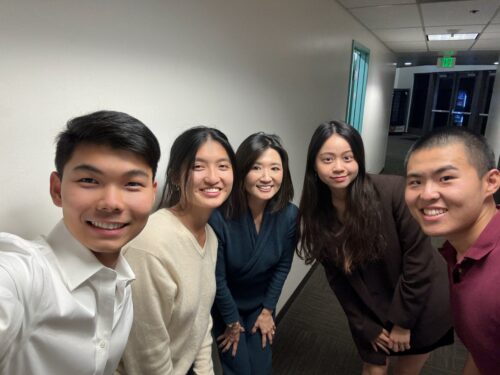Iris Leung, Juntong Shi, Peiyi Sun, and Nicole Zhang are students in professor Helen Choi’s fall course WRIT 340 for Engineers at the University of Southern California Viterbi School of Engineering.
For an upper-division composition course for engineers at the University of Southern California (USC), we edited a Wikipedia article on the Chinese online marketplace, Temu, by adding over 3,700 words and 56 references and raising the article’s maturity rating from start-class to intermediate-class. This article is very popular with daily average views in excess of 6,700, and our edits have been viewed over 110,000 times. By doing this assignment, we honed our writing, research, and collaboration skills and we were also able to integrate our multilingual skills in a formal classroom assignment. In addition, writing for a real-life and public audience helped us to view our abilities as students in a U.S. university in a more expansive way, as we could see how our language skills are valued in the classroom and on Wikipedia.

While we all are proficient in Mandarin, we come from different backgrounds in North America and China. Nicole was born in Toronto, Canada and grew up in Beijing, speaking Mandarin at home. However, she spoke English almost exclusively at school starting in the sixth grade, as she attended an international school where speaking English was strictly enforced. Nicole majors in Arts, Technology, and the Business of Innovation at USC’s Iovine and Young Academy (IYA). Peiyi also majors in Arts, Technology, the Business of Innovation at IYA and is from Beijing. Peiyi’s first language is Mandarin, and he began learning English from an early age. Iris, from Northern California’s Bay Area, studies at IYA alongside Peiyi and Nicole. Iris is proficient in Cantonese and attended an English and Mandarin immersion school from grades K-8. The engineering major of the group, Juntong, studies computer science and applied mathematics, and like Peiyi, he was born and raised in Beijing. He expanded his English-language skills by taking Advanced Placement classes and studying abroad in high school.
We chose to work on the Temu article because we were familiar with Temu’s parent company, PinDuoDuo in China, and also because the article received a lot of daily page views but was missing a lot of key information. We wanted to help make the page more comprehensive and balanced, as it originally consisted mostly of the company’s negative reviews. As a team, we discussed some of the potential biases of the English-language sources towards Chinese businesses and brainstormed new ways of creating a well-rounded article that included the company’s problems, as well as information about how it operates. We used our Chinese-language abilities to conduct research to find quality sources to add more reliable content to the Temu article. For example, Nicole suggested we use a Chinese database, CNKI, to find academic research about Temu’s discounting and marketing policies. Because of her experience with working with CNKI sources at Tsinghua University, she was confident with the database’s credibility. Juntong also used popular Chinese news sources like NetEase for company information and facts about Temu’s parent company, PinDuoDuo. Applying these sources, we added information that is difficult to find in English-language sources.
Despite choosing the Temu page for its high volume of readers, we were still surprised at the negative and positive reactions of other editors to our additions and some of their wholesale reversions caught us off guard. Rather than engage in edit wars, however, we worked with our professor to reach out to editors and learned that they perceived our initial edits to be overly promotional and biased; in response, we removed any content that lacked a neutral tone and added more reputable sources. In this way, vigilant editors helped improve our work, and our subsequent edits about Temu’s logistics, lawsuits, and pricing strategies were not reverted. As of today, Peiyi, who, along with Iris and Juntong, made the edits on Wikipedia on behalf of our group, is the top editor for the article in terms of amount of text added.
We take great pride in our contributions to Temu’s Wikipedia page, as they contribute to the world’s understanding of a growing global company. Like many college students, we have been taught to avoid Wikipedia because anyone can edit it. However, looking at the obstacles we encountered even when adding information from reliable sources, we realized that information on Wikipedia is highly scrutinized by editors who care about Wikipedia’s quality. We also learned that adding information is not enough – we must also consider the geopolitical context in which editors operate while keeping in mind the goal of providing neutral information.
As one of the few instances in the U.S. composition classroom in which our multilingual skills were officially part of the curriculum, the Wikipedia assignment helped boost our confidence in our communication skills. We not only added information that might not otherwise be available to English-speaking Wikipedia, but we also learned that our cultural insights can be critical tools for making meaningful and lasting contributions to the world’s encyclopedia.
